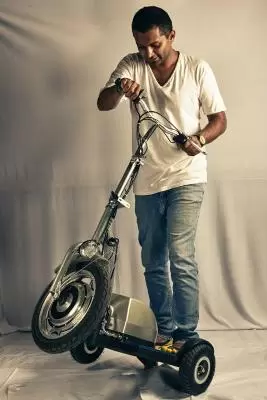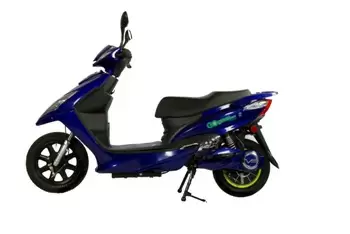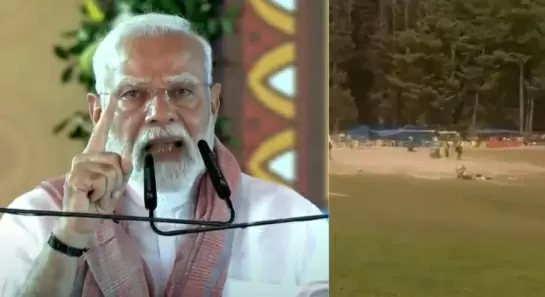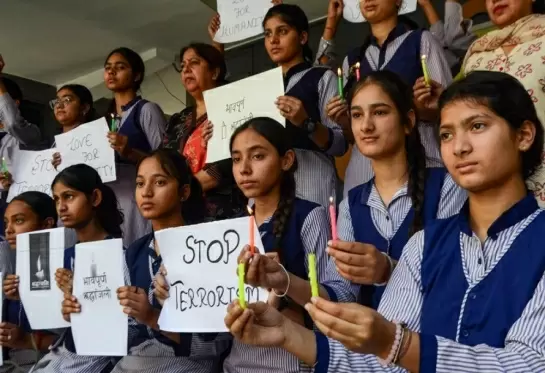The maker of electric scooter plans to come out with an electric autorickshaw

26-July-2013
Vol 4 | Issue 30
He is a second generation entrepreneur, who is following in his father’s footsteps seeking eco-friendly alternatives to petrol and diesel vehicles.
Nearly a decade and half ago, Dhivik Reddy’s father introduced the ‘conversion kit’ in Bangalore that enabled petrol cars to run on LPG at his automobile service station in JP Nagar.
 |
|
Dhivik on a personalized electric three-wheeler that is delivered on group orders
|
“We were the first to introduce the kit in India. It was imported from Italy,” says Dhivik, making every effort to turn the spotlight on his father, who he says moved to Bangalore from Kolar in the 1980s resigning his job as a college lecturer.
“He had no knowledge about vehicles when he started the service station. But he was determined to learn and succeed.
“He wanted to do his bit to create a greener planet. He promoted LPG vehicles, as they were less polluting than petrol,” says thirty-year-old Dhivik, who heads a company that makes energy efficient and zero emission electric scooters.
The Go GreenBOV (Battery Operated Vehicle) electric scooters that hit the market in 2011 come in 4 models and are priced from Rs.28, 000 to Rs. 49, 500.
The vehicles come with batteries of various capacities and cover distances ranging from 50 km to 120 km on full charge.
Sharath Kumar, a top executive with Narasus Coffee in Bangalore uses their top end model, Kavach, to commute to work. “On an average I travel about 1500 km on the bike every month. I am paying an extra Rs.300 on my electricity bill, that’s all,” he says.
While no petrol bike can come anywhere close to its running cost per km, the electric scooter falls way behind even a TVS Scooty in terms of speed, as it attains maximum speed of only 25 km per hour.
Dhivik says the speed limit has been imposed on the makers of electric scooters by the regulatory body, Automotive Research Association of India (ARAI).
“ARAI has blindly followed European standards. In Europe, electric scooters run on cycle lanes, and the speed limit is to protect the cyclists,” says Dhivik.
He adds that the Society of Manufacturers of Electrical Vehicles in India has asked for permission to increase the speed limit, so that more people would switch to electric vehicles.
“It will help in reduction of carbon footprint,” says Dhivik.
 |
|
Go GreenBOV scooters, like any other electric vehicle, help reduce our carbon footprint
|
ARAI is expected to give its nod anytime, a move which is likely to benefit about 12 manufacturers, including Go GreenBOV.
The low speed of electric scooters may be a deterrent for some, but it obviously did not matter to over 14, 000 customers who have purchased various models of Go GreenBOV scooters.
While the high end model can comfortably carry two adults, the other models can carry an adult and a child.
None of the models require a registration or a number plate and can be driven by children above 14 years of age.
Dhivik says it is safe to ride the scooter even in the rain and there is no danger of suffering a shock.
The battery has to be replaced every 25, 000 km or two and half years, whichever is earlier. The battery costs around Rs.10, 000 – Rs. 14, 000.
“We have dealers in all South Indian states. Karnataka accounts for 65 percent of our sales, followed by Tamil Nadu and Andhra Pradesh,” says Dhivik.
The company achieved a turnover of Rs. 31 crore last year.
“We are currently selling around 700-900 vehicles per month. We need to do at least 1100 vehicles per month to break even, though our production capacity is 1500 vehicles per month,” says Dhivik, who took a BE electronics degree from RVCE, Bangalore.
.webp) |
|
Dhivik is passionate about diving and surfing
|
“I completed the degree with great difficulty. I dropped out of college for a while and then rejoined to finish the course. It took me 8 years to complete my degree,” he reveals with remarkable candour.
The company has plans to develop the country’s first electric autorickshaw, which would run for 150 km in just Rs.20 worth electric charge and attain a top speed of 60 km per hour.
Dhivik, who owns half dozen surf boats, is passionate about water sports. He loves to go surfing, and is a certified scuba dive master.
“I have dived and surfed around the world, in Philippines, China, Indonesia, and many other places,” he says.














